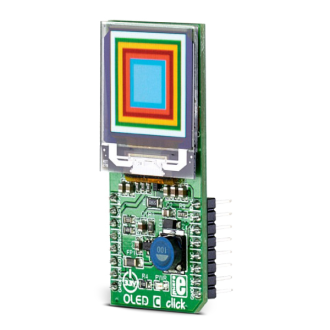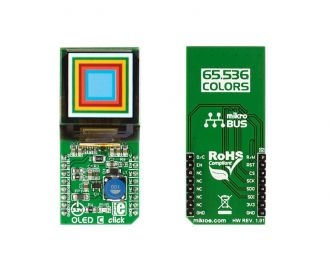
We strongly encourage users to use Package manager for sharing their code on Libstock website, because it boosts your efficiency and leaves the end user with no room for error. [more info]

Rating:
Author: MIKROE
Last Updated: 2018-01-29
Package Version: 1.0.0.1
mikroSDK Library: 1.0.0.0
Category: OLED
Downloaded: 11579 times
Followed by: 2 users
License: MIT license
OLED C click arries the PSP27801 OLED display, the same one that we have used on Hexiwear. The click is designed to run on 3.3V power supply only. It communicates with the target microcontroller over an SPI interface.
Do you want to subscribe in order to receive notifications regarding "OLED C click" changes.
Do you want to unsubscribe in order to stop receiving notifications regarding "OLED C click" changes.
Do you want to report abuse regarding "OLED C click".


Library Description
The library initializes and defines the SPI bus driver and drivers that offer a choice for writing data in the registers and reading data from the registers. The library includes functions for drawing a picture, pulls a rectangle and writes text on the screen.
The user can set the desired text font, and adjust the background color.
Key functions:
Examples Description
The application is composed of three sections:
void applicationTask()
{
oledc_fill_screen( 0xFFFF );
Delay_100ms();
/* Rectangle demo*/
oledc_rectangle( 0, 0, 96, 96, 0xF000 );
Delay_ms( 500 );
oledc_rectangle( 5, 5, 91, 91, 0xFF00 );
Delay_ms( 500 );
oledc_rectangle( 10, 10, 86, 86, 0x00F0 );
Delay_ms( 500 );
oledc_rectangle( 15, 15, 81, 81, 0x0F0F );
Delay_ms( 500 );
oledc_rectangle( 20, 20, 76, 76, 0xF000 );
Delay_ms( 500 );
oledc_rectangle( 25, 25, 71, 71, 0xFF00 );
Delay_100ms();
/* Line demo */
oledc_rectangle( 25, 25, 71, 27, 0 );
Delay_100ms();
oledc_rectangle( 25, 71, 71, 73, 0 );
Delay_100ms();
oledc_rectangle( 25, 25, 27, 71, 0 );
Delay_100ms();
oledc_rectangle( 68, 25, 71, 71, 0 );
Delay_ms( 3000 );
/* Image demo */
oledc_image( &me_logo_bmp[0], 0, 0 );
Delay_ms( 2000 );
}
Other mikroE Libraries used in the example:
Additional notes and information
Depending on the development board you are using, you may need USB UART click, USB UART 2 click or RS232 click to connect to your PC, for development systems with no UART to USB interface available on the board. The terminal available in all MikroElektronika compilers, or any other terminal application of your choice, can be used to read the message.